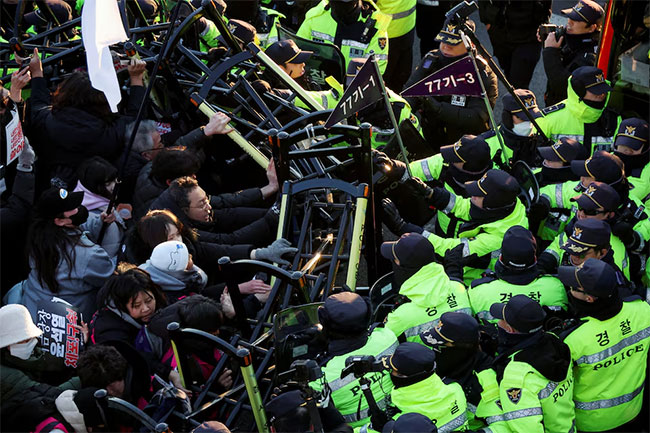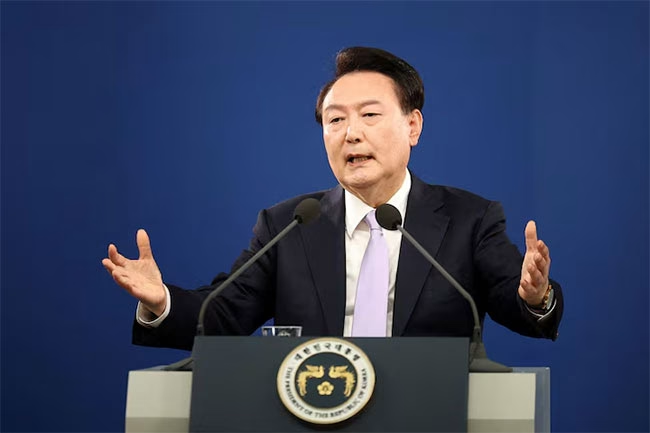South Korean presidential guards prevent arrest of impeached Yoon after tense stand-off

South Korea’s presidential guards and military troops prevented the authorities from arresting impeached President Yoon Suk Yeol on Jan 3 in a tense six-hour stand-off inside his compound in the heart of Seoul.
Mr Yoon is under criminal investigation for insurrection over his Dec 3 martial law bid that stunned South Korea and led to the first arrest warrant being issued for a sitting president.
“It was judged that it was virtually impossible to execute the arrest warrant due to the ongoing stand-off,” the Corruption Investigation Office for High-ranking Officials (CIO) said in a statement.
The CIO officials and police evaded hundreds of Mr Yoon’s supporters who gathered in the pre-dawn hours near his residence on Jan 3, vowing to block the arrest “with our lives”. Some chanted “President Yoon Suk Yeol will be protected by the people”, and called for the head of the CIO to be arrested.
Officials from the CIO, which is leading a joint team of investigators looking into possible insurrection charges related to Mr Yoon’s brief declaration of martial law, had arrived at the gates of the presidential compound in central Seoul shortly after 7am local time (6am Singapore time), and entered on foot.
Once inside the compound, the CIO officials and police were outnumbered by cordons of Presidential Security Service (PSS) personnel, as well as military troops seconded to presidential security, a CIO official told reporters.
More than 200 PSS agents and soldiers formed several layers of human chains to block the CIO officials and police, the official added. While there were altercations and PSS agents appeared to be carrying firearms, no weapons were drawn in the stand-off, the official said.
Mr Yoon, who has been isolated since he was impeached and suspended from power on Dec 14, was not seen during the stand-off, the official added.
The Defence Ministry said the troops were under the control of the PSS.
The CIO called off the effort to arrest Mr Yoon around 1.30pm due to concerns over the safety of its personnel, and said it “deeply regretted” his non-compliance.
The CIO said it would consider its next steps.
The police, who are part of the joint investigation team, have designated the PSS chief and deputy as suspects in a criminal case for obstruction of official duty and issued summonses for them to appear for questioning on Jan 4, Yonhap news reported.
Insurrection is one of the few criminal charges from which a South Korean president does not have immunity.
Mr Yoon’s arrest warrant, approved by a court on Dec 31 after he ignored multiple summonses to appear for questioning, is valid until Jan 6.
In a statement after the arrest effort was suspended, Mr Yoon’s legal team said the CIO had no authority to investigate insurrection, and that it was regrettable that it had tried to execute an illegal warrant in a sensitive security area.
The statement warned police against supporting the arrest effort.
The presidential office filed a criminal complaint against three broadcasters and YouTube channel owners for unauthorised filming of the presidential residence, which it said was “a secured facility directly linked to national security”.
The current warrant gives investigators only 48 hours to hold Mr Yoon after he is arrested. Investigators must then decide whether to request a detention warrant or release him.
Korea University law professor Kim Seon-taek said targeting the PSS leadership may allow the investigators to sap the service’s ability to put up resistance so they can try again to execute the warrant, which is “a rough way” to proceed.
A better way, he said, would be for Acting President Choi Sang-mok to exercise his power to order the PSS to cooperate.
Later on Jan 3, the CIO said it would ask Mr Choi to give that order.
Surprise martial law
Mr Yoon sent shock waves through Asia’s fourth-largest economy and one of the region’s most vibrant democracies with a late-night announcement on Dec 3 that he was imposing martial law to overcome political deadlock and root out “anti-state forces”.
Within hours, however, 190 lawmakers had defied the cordons of troops and police to vote against his order. About six hours after his initial decree, Mr Yoon rescinded it.
He later issued a defiant defence of his decision, saying domestic political opponents are sympathetic to North Korea and citing uncorroborated claims of election tampering.
Two South Korean military officials, including army chief Park An-su who was named martial law commander during the short-lived declaration in December, have been indicted on insurrection charges, Yonhap reported on Jan 3.
Kim Yong-hyun, who resigned as Mr Yoon’s defence minister after playing a major role in the martial law decree, has been detained, and was indicted last week on charges of insurrection and abuse of power.
Separate from the criminal investigation, Mr Yoon’s impeachment case is before the Constitutional Court to decide whether to reinstate or permanently remove him.
A second hearing in that case was held on Jan 3, and the court set the first oral arguments for Jan 14.
Mr Bae Jin-han, one of the lawyers for Mr Yoon, told reporters that Mr Yoon may not appear for the first arguments but will likely do so at a future hearing to argue his position.
North Korea’s state media published a detailed report on the political turmoil in the South, including the arrest warrant issued for Mr Yoon, who it said “stubbornly refuses to be investigated, totally denying his crimes with sheer lies”.
SOURCE: REUTERS
–Agencies

